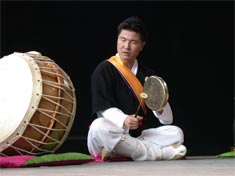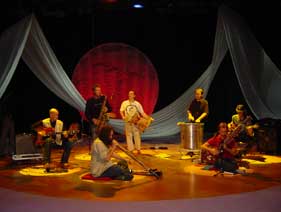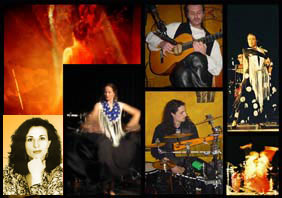The genesis of the project
In 2004 Comin’ and Goin’ was again invited as a „special guest“ to an international festival in Korea: the „World Culture Open (WCO) 2004“. About 400 selected contenants from all over the world meet for „cultural olympics“, however, mutual interchange and inspiration are well to the fore. According to the philosophy of that festival Comin’ and Goin’ decided to invite other artists, who are friends, to join a common project:
Comin´ and Goin´ meets Alcala meets Asmita Banerjee
Special Guest - Kim Dong-Won
Traditional Korean Percussion und Singing, used to accompany Ppansori“ (traditional story singing) and „Samul Nori“ (traditional percussion ensemble).
Comin´and Goin´(Austria)
Unusual instruments and fascinating sound patterns – these are the characteristics of the Austrian music group Comin´ and Goin´ (since 1996), which has, among other things, produced two CDs (Polyglobemusic Austria): „Baoingo“ (1998) and "Snowflakes In June" (2001). In the case of Comin´ and Goin´, the sheer variety of the music played and the range of instruments employed to enchant their audience are so great that the title „Crossover World Music“ is more than well motivated. The soundscapes they create are generated on the one hand by the use of non-European natural-tone instruments, namely the Indian sitar, the Australian didgeridoo, the Korean changgo, buk, guengari and ching and the berimbau from Angola and Brazil, and on the other by the attractive contrast offered by the guitar synthesizer and electric six-string- and fretless bass, the saxophone and EWI (Electric Wind Instrument or MIDI-sax).
It is the bold mix of instruments and the related musical traditions plus the group‘s sheer musical creativity that produce the exciting style of ,,Crossover World Music“. The result is a form of musical expression whose sounds carry us off into a multicultural and meditative-dynamic world.
Line up of Comin’ and Goin’:
Alex Mayer - didgeridoo
Bernhard Noriller - changgo, berimbau, small percussion
Klaus Falschlunger – sitar
Bernhard Kowatsch - guitar, guitar, guitar synthesizer
Paul Heis - soprano and tenor saxophone, EWI, bodhran
Gerald Rumpold - six-string and fretless bass guitar
Erwin Vindl - surdo, buk, small percussion
Asmita Banerjee (India)
Born 1972 in Kolkata (India), 1993-1996 training in classical Ballet at the University Sports Institute of Vienna; 1995-1997 several study trips to Shantiniketan (West Bengal) for Manipuri Dance training with Jatindra Singh; since 1996 classical South Indian Dance with Radha Anjali, 2002 Arangetram (solo-debut, completion of the basic dance training) in Vienna at the Interkulttheater; since 1998 member of the Natya Mandir Dance Company; 1998, 1999 and 2002 educational trips for several weeks to Chennai (South India) at the Bharata Choodamani Academy with Adyar K. Lakshman; performances since 1998 in Austria, Hungary, Slovenia, Italy, India.
Bharata Natyam is classified into two forms, the abstract dance nrtta and the narrative dance nrtya. The expression of the abstract form shows pure joyousness in movement, whereas with the narrative nrtya, tales of the ancient Hindu mythology are told.
Alcalá (Austria/Bulgaria/Spain)
Alcalá emerged from a meeting of artists, who have set their heart upon flamenco for years. Starting with the various styles of traditional flamenco music the group brings in their individual interpretation of that music.
Flamenco is the result of a multiple cultural and social process, which took place in the south of Spain. Especially in times of Arabien dominion (711-1492) the music of very different cultures (Jewish synagogue singing, North-African music, Turkish and Persian music, Syrian and Indian music) established itself. The melting of all these influences caused this typical musical style from Andalusia. singing is, amongst all the different ways of expression, the earliest and most important part, an inspiration for the guitar as well as for dancing. In the numerous styles of this music you find the accomplished expression of Andalusian tradition, which goes back to antiquity.
Line up of Alcalá:
Tanja Stekl – dance
Selina Stekl - dance
Alexander Kunchev – percussion
Dietmar Rumpold – guitar
Carmen Amor
– voice
Contact
Bernhard Noriller
Adamgasse 9/2
A-6020 Innsbruck
Austria
Kim Dong-Won (Korea)
Born in 1965 in Busan (Republic of Korea); in 1986 he began his study of traditional Korean percussive music, the drum techniques used to accompany „Pansori“ (traditional story singing) and „Samul Nori“ (traditional percussion ensemble) from many great masters; has been working on research and education area of Korean traditional music and has an active career as a performing artist also; has taught at many Universities in Korea and at „Musikakademie“ of Basel (Switzerland) since 1994; as a member of Silk Road Ensemble (founded by Yo-Yo Ma), he shared his unique musical energy with the audiences in Europe and United States; additionally, he wrote not only many music books but also created several fairy tale books which inspires children into the world of Korean tradition; became recently a major professor at The Wonkwang Digital University to teach Korean traditional music through Internet. .
Comin´and Goin´
In a natural and relaxed way Comin´ and Goin´ brings together the elements of most diverse cultures to an independent sound.
„With great pleasure you listen to organically developed, uncrampt, jazzy world music without opportune winds.”
Tiroler Tageszeitung
Asmita Banerjee
Bharata Natyam is a classical dance form of South India. It was performed in Hindu temples and was a part of the religious ritual. Today Bharata Natyam is merely danced on stages, but it has not lost its spiritual orientation.
Alcalá
Flamenco – the magically pleasing movements of the dance, varied with impassioned step dancing, melt with the sound of the flamenco guitar and in an impressing stage performance bring near the rhythmical and melodious variety of that music to the audience.
Comin´and Goin´
meets
and
Asmita Banerjee
Alcalá
Kim Dong-Won
meets




